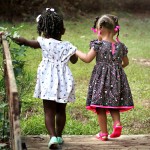|
Our research has shown links between how individuals respond to others’ emotions and their psychological functioning.
|
-
Both sympathy and self-distress physiological responses to mothers’ anger and sadness facilitated young children’s understanding of mother’s emotions (Tully, Donohue, & Garcia, 2015).
-
Moderate, well-regulated empathy was protective against depression in young adults (Tully, Ames, Garcia, & Donohue, 2016).
-
Toddlers learn behaviors to comfort their parents by watching the behaviors of others (Williamson, Donohue, & Tully, 2012).
|

|
|
Our recent work has pinpointed young children’s processing of mothers’ happiness as a novel clue to understanding their risk for depression and anxiety.
|
-
Positively biased interpretations of mothers’ emotions were normative during early childhood, and children who did not have these positivity biases had elevated internalizing problems (Donohue & Tully, 2016).
-
Empathic happiness in response to mother’s happiness is adaptive in children of nondepressed mothers and, conversely, maladaptive in children of depressed mothers (Tully & Donohue, 2016).
-
Click here to learn more about our “happiness” findings.
|

|
|
We also found evidence for environmental intergenerational transmission of risk for internalizing problems during childhood.
|
-
Depression in mothers was associated with environmental risk that could not be explained by genetic influences (Tully, Iacono, & McGue, 2008).
-
Shared (family) environmental influences were significant during childhood but their influence decreased and became negligible across adolescence as genetic influences became stronger (Tarantino, et al., 2014; Tully, et al., 2010; Garcia, et al., 2013).
|

|
|
Although our work has largely focused on the role of mothers, we are also interested in the understudied role of fathers.
|
-
We have found smaller effects of fathers’, relative to mothers’, depression and stress and larger effects of fathers’ cognitive styles on their children’s psychological functioning (Tully, Gray, Goodman, & Nowicki, 2016; Tully, Iacono, & McGue, 2008).
|

|




